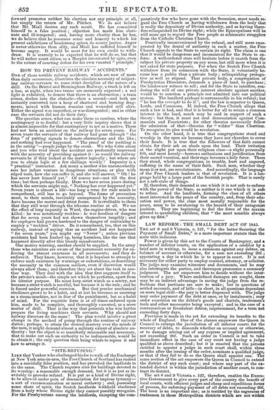"SITE-REFUSING."
LIKE that Yankee who challenged his foe to walk off the Exchange at New York arm-in-arm, the Free Church of Scotland has rushed into a suicidally false position, and has provoked the landlords to do the same. The Church requires sites for buildings devoted to its worship : a reasonable enough demand, but it is so put as in- evitably to provoke refusal. It is put as a kind of Divine right, to be allowed under pain of denunciation for impious tyranny— a sort of excommunication or moral outlawry ; and, possessing some share of spirit, the Scotch landlords withhold obedience from a body whose Divine right they cannot possibly recognize. For the Presbyterians among the landlords, excepting the com-
paratively few who have gone with the Secession, must needs re- gard the Free Church as having withdrawn from the body that is really the depository of Divine authority, and as basing there- fore relinquished its Divine right; while the Episcopalians will be still more apt to regard the Free people as schismatic stragglers from the Catholic Christian Church.
Practically inconvenienced by the refusal, and still more exas- perated by the denial of authority in such a matter, the Free Church appeals to the State to sustain its right. The claim is one that it would be dangerous and inconsistent for the State to en- force. A well-ordered state will hesitate before it snatch from the subject his private property on any score, but still more when it is not asked for state purposes. For when the Scotch Free Church withdrew from its connexion with the State, it voluntarily be- came less a public than a private body ; relinquishing preroga- tive as well as stipend. That private body, a congregation of Presbyterian Dissenters, demands a piece of land, to purchase ; the landowner refuses to sell; and for the State to interfere, ren- dering the will of one private interest absolute against another, would be to sanction a principle not admitted into our political system. The landlord perhaps is unreasonable in his refusal; but "he has the rrrright to do it"; and the law is superior to Queen, Lords, and Commons. If, indeed, the Free Church allege that such a law is bad, and that it is better for all to retain a common interest in the land, much may be said in support of such a theory : but then, it must not deal denunciation against Com- munists and Fourierists ; for other theories necessarily follow the admission of that—theories far " wilder " than Chartism. To recognize its plea would be revolution.
On the other hand, it is true that congregations stand and worship in the open air because they have not churches to cover their heads. It is true that the followers of that faith cannot obtain for their ark an abode upon the land. Their irritation at the slight put upon their religious class—a slight personally felt, and most keenly—borrows enthusiasm and justification from their sacred vocation, and their rage becomes a holy furor. There they stand, whole congregations, in trouble, hurt and angered, suffering in the name of their faith. Such men, whether they mean it or not, are revolutionists. And accordingly, the language of the Free Church leaders is that of revolution. It is a lan- guage held by a large part of the Scottish people. That is surely not a safe state of things. If, therefore, their demand is one which it is not safe to enforce with the power of the State, so neither is it one which it is safe to refuse. And the landlords, forming the class of all others most interested in the peace of the country, and, from their edu- cation and power, the class most morally responsible for the peace, seem to be awakening to the hazard of their antagonist position. They are beginning to feel the force of the maxim uttered to quarrelling children, that "the most sensible always gives up first."


























 Previous page
Previous page